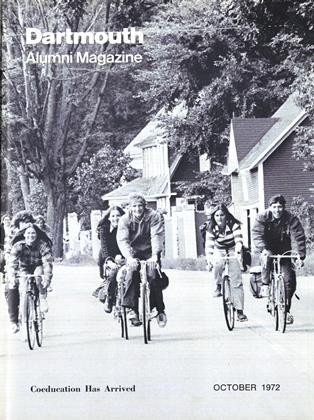THE PAPERS OF ADLAI E. STEVENSON: BEGINNINGS OF EDUCATION 1900-1941.
OCTOBER 1972 CHARLES M. WILTSELTHE PAPERS OF ADLAI E. STEVENSON: BEGINNINGS OF EDUCATION 1900-1941. CHARLES M. WILTSEL OCTOBER 1972
Vol. 1. Edited by Walter Johnson '37. Carol Evans, Assistant Editor.Boston: Little Brown and Company, 1972.586 pp. $15.
Most Americans were unaware of Adlai E Stevenson before the summer of 1952 when he was nominated to run against General Eisenhower for the Presidency. Yet few men were ever better prepared by birth, by aptitude, and by training for high public office. Those who doubt may examine the evidence for themselves in this first of eight volumes of Stevenson papers, which illuminates the education of a statesman as only well-selected source documents could do.
Grandson of an obscure vice president for whom he was named, Stevenson came of a family immersed in Democratic politics. There was enough of patrimony to give young Adlai all the intellectual tools he would need: Choate School, Princeton, Harvard Law, and finally a law degree from Northwestern, preparatory to a Chicago practice. Interspersed were a very active summer in Europe, two years as managing editor and occasional reporter on the family-owned newspaper in Bloomington, Ill., and political indoctrination at the Democratic Convention of 1924, where his father placed in nomination the name of David F. Houston.
Stevenson's college letters to his parents are uninhibited. He loved the student life in which he participated actively; he took part in sports; and he made lasting friendships. His letters home from Europe are full, whimsical, keenly observant, and give promise of the literary skill to come. As a reporter, young as he was, he tempered facts with compassion.
Although family connections could have been used, young Stevenson preferred to find his own niche at the Chicago bar. Along with his practice he quickly interested himself in civic matters, and through the Chicago Council on Foreign Relations developed an abiding interest in international affairs. Like so many liberal young intellectuals, he followed Roosevelt to Washington, where he served on the legal staff of the Agricultural Adjustment Administration. Fifteen months later he was back in Chicago, widening his political and intellectual horizons. Despite a strong isolationist sentiment among his clients, he worked vigorously for aid to the Allies. When he could stay on the sidelines no longer, Stevenson again went to Washington, this time as personal counsel to Navy Secretary Frank Knox, former Chicago publisher.
Such in capsule form is the beginning of a fabulous career, as told for the most part in Stevenson's own words, in letters to family and friends, business and political associates, and in occasional speeches, public comments, and formal writings. The editors have selected with skill and tact from a mass of available materials. They have chosen to include only letters by Stevenson, which is a pity but dictated by the fact that many of the correspondents are still alive. Background events are explained and connections indicated in frequent italicized fragments of text inserted at appropriate places. This device makes it possible to hold footnotes to a brief and necessary few. The editing is commendably unobtrusive.
The volume may be and will be read for pleasure as well as for instruction, even though it serves only to deepen this reviewer's regret that Adlai Stevenson never became President.
Mr. Wiltse is Editor of The Papers of Daniel Webster and Professor of History, Emeritus.
 View Full Issue
View Full Issue
More From This Issue
-
 Feature
FeatureBetting man's choice: Dartmouth. Then Harvard, Columbia, Cornell
October 1972 -
 Feature
FeatureVerdict on the Dartmouth Institute: A-OK
October 1972 By ROBERT B. GRAHAM '40 -
 Feature
FeatureCoeducation Becomes A Reality
October 1972 By MARY ROSS -
 Feature
FeatureHanover's "Host with the Most"
October 1972 By JAMES L. FARLEY '42 -
 Feature
FeatureHomage to the great god Pigskin: One hundred years of Ivy rivalry
October 1972 -
 Feature
FeatureNew Facilities in the Making
October 1972
Books
-
 Books
BooksHORMONES AND HORTICULTURE,
April 1948 By C. L. WILSON. -
 Books
BooksPROSE & POETRY OF MODERN FRANCE.
NOVEMBER 1964 By DAVID SICES '54 -
 Books
BooksERNEST HEMINGWAY: A LIFE STORY
MAY 1969 By JEFFREY HART '51 -
 Books
BooksTO THE GREAT OCEAN.
FEBRUARY 1966 By JOHN C. ADAMS -
 Books
BooksBACK WHERE I CAME FROM
April 1939 By Kenneth A. Robinson -
 Books
BooksTHE COURT OF VENUS.
May 1956 By L.D. PEARSON

